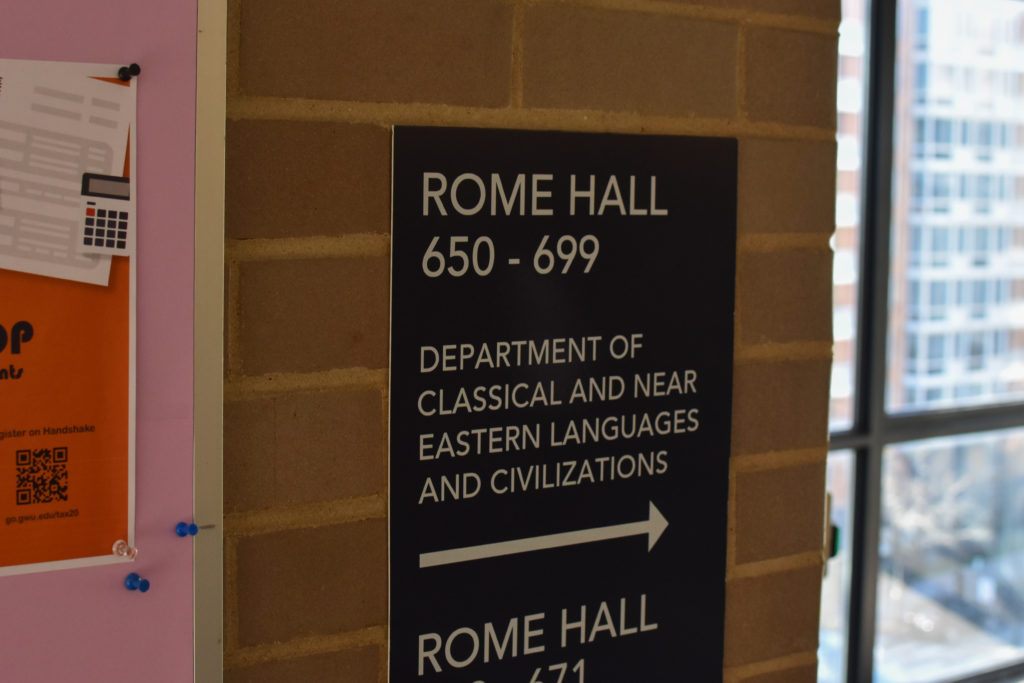Members of the Department of Classical and Near Eastern Languages and Civilizations plan to debut a Biblical Hebrew program next semester.
Students majoring or minoring in Classical and Ancient Near Eastern studies could previously fulfill their history, culture and language requirements only by taking two years of ancient Greek or classical Latin. Faculty said the new program will allow students to explore a different classical language to fulfill their language requirement and help the department meet a growing interest in Ancient Near Eastern studies.
Christopher Rollston, an associate professor of Northwest Semitic languages and literature, said the idea for a Biblical Hebrew program grew out of interest from students and recent faculty hires with backgrounds in Mesopotamia and the ancient Levant.
“Because of the broadening nature of our course-offerings, the faculty decided at our most recent faculty meeting a few weeks ago that it would be useful and important to allow Biblical Hebrew to be one of our language options,” Rollston said in an email.
Rollston said he taught one student Biblical Hebrew as an independent research course in the fall, adding that since then, four other students have joined the informal “course” this semester, which inspired him to want to offer a full program to more students.
He said he believes that there will be a strong interest in the Biblical Hebrew program because of its role and importance to students in the major studying or interested in Judaism and Christianity. Rollston added that the program may appeal to students in the Elliott School of International Affairs because many international affairs courses focus on the Middle Eastern region, and this program will teach students about a foundational element of the ancient Middle East.
Rollston said faculty in the classics department is working with Columbian College of Arts and Sciences officials to finalize and approve the program, which he hopes will come together in the next one to two months. He said the department still has to send formal documents to deans establishing the program and must work with the advising office to set up the program’s requirements in DegreeMAP.
Because Rollston is the only person in the department trained in Biblical Hebrew, he said he will teach a 2000s-level course titled Biblical Hebrew starting next academic year. He said the department will also offer a 1000-level course titled Elementary Modern Hebrew starting next academic year, taught by multiple professors in the department.
He said no new faculty will be hired for the program.
“Doing a major with us will mean that students are studying with faculty who are very devoted to teaching and with faculty who are also very devoted to impacting the field with our research and publications,” Rollston said.
Six of GW’s 12 peer schools have course offerings in Biblical Hebrew.
Eric Cline – a professor of classics, anthropology and history – said allowing students to take Biblical Hebrew to satisfy the CANES language requirement will appeal to students who are interested in “the Near Eastern side of things” and will potentially give them a better chance at graduate school acceptance by allowing them to gain experience with more ancient near eastern course options to complete their major.
“I expect that it will appeal to a number of people especially interested in this as a second major – it is a natural fit with the archaeology major or a history major, for example,” Cline said. “I also think that we’ll get more minors as well.”
Orian Zakai, an assistant professor of Hebrew and Israeli literature and culture, said she will be one the professors teaching Modern Hebrew, another prerequisite for students who want to take Biblical Hebrew.
“I am very happy about the offering of Biblical Hebrew because it is consistent with my vision of Hebrew as a language that has multiple histories, both ancient and modern, and it’s relevant both to classical studies and to studies of the contemporary Middle East,” Zakai said.
Zakai said the Biblical Hebrew program will offer students knowledge that will help them in studies of Judaism, the ancient Middle East and the relationships between ancient Middle Eastern languages and modern Hebrew.
She said students studying modern Hebrew may be interested in studying the older version of the language to enhance their understanding because many idioms, tropes, words and sentences are influenced by biblical Hebrew.
“Hebrew is really both a language that is contemporary and relevant to politics of the day, but it is also a language that is a cornerstone of Western civilization much like ancient Greek or Latin, so I am glad we are able to make these connections,” Zakai said.
Zakai said she is “impressed” by the wide-ranging academic interests of students who are curious about Hebrew as a language.
“GW is very unique in the sense that students who study Hebrew and Hebrew culture have multiple interests in the language,” she said. “They want to be able to use it in contemporary Israel, but they are also interested in the long history of the language and its connection with religion and the ancient Jewish texts.”








